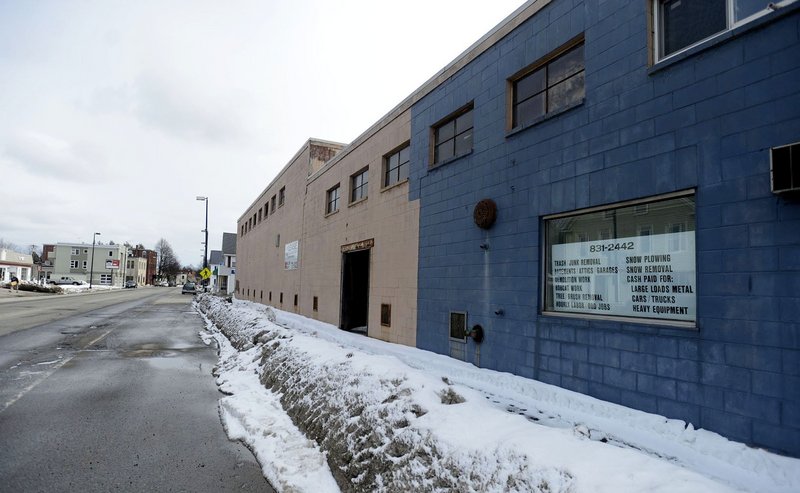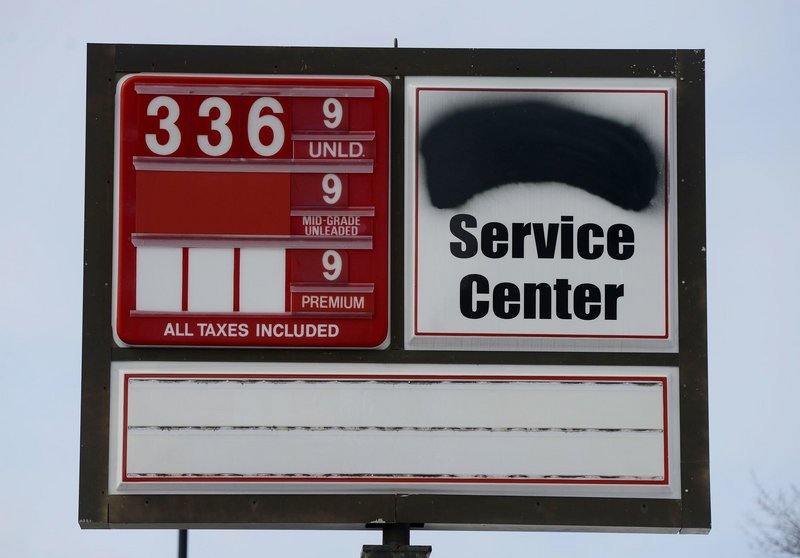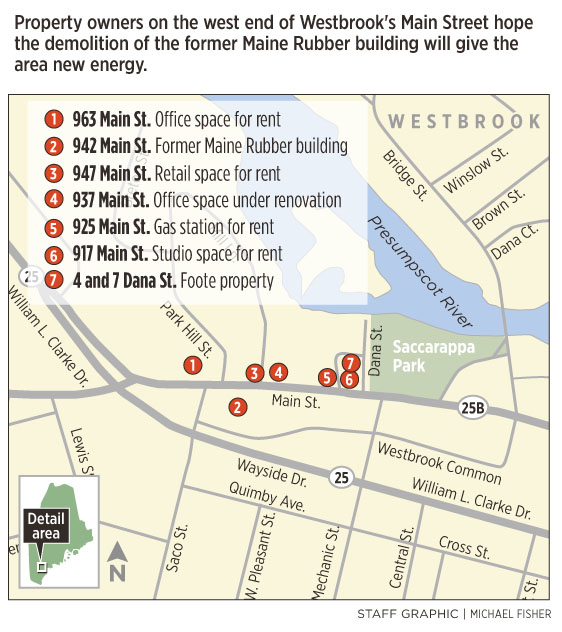WESTBROOK – Westbrook’s Main Street flows seamlessly from Portland’s Brighton Avenue, a highway lined with strip malls and chain stores.
At City Hall, it scales down to two tree-lined lanes and, after the rotary, hits its stride with a bagel shop, a popular park and a post office.
But just past the heart of downtown — a hub of reputable eateries and revamped mill buildings — things start to fall apart.
There’s a lifeless lot posing as a park, stand-alone buildings with drab siding and empty storefronts and, most notably, the concrete wall of the former Maine Rubber Co. plant that stretches down the block.
“Sometimes I think they ignore this end of town,” said Linda Prue, standing outside the apartment building she manages at 953 Main St.
Although Westbrook has been moving away from its mill-town roots, with ethnic restaurants and artists’ studios giving the city new life, the west end of Main Street seems to have gotten left behind. But a promising proposal to demolish the imposing rubber plant, and plans for other properties in the works, might mean the downtown dead zone could soon come alive.
“It’s going to be like a domino effect,” said Bill Baker, assistant city administrator and director of business and community relations.
The first attempt to extend activity beyond the intersection with Bridge Street happened two years ago, when Westbrook Housing built a three-unit condominium complex at 917 Main St. with retail space on the first floor. The idea was to have artists live in the condos and work in studios below.
City Planner Molly Just said the housing authority “braved the new frontier with that project.”
The condos sold, but not to artists, and aside from a massage therapist who recently moved out, the studios have been empty since they opened.
The for-rent sign on the building is hardly the only one in the neighborhood.
Next door is a vacant gas station with black spray paint covering the sign for LeClerc’s Service Center, which closed a year ago. Behind the condo complex are the dilapidated buildings of a former printing business that hasn’t churned out a product since 2008.
Down the street, a dry cleaner was forced out by a fire, and there’s empty office space that for 30 years was home to a locksmith business now operating out of a truck.
But people who are invested in the area are optimistic that the demolition of the former Maine Rubber building could spark a bigger change.
“I feel it’s going to upgrade the neighborhood,” said Peter Wallace, who owns the four-unit building at 963 Main St. where the locksmith was.
“Say it’s replaced by a commercial building of some sort — I would think that whole area would be ripe for new businesses,” said Dick Begin, director of community development for Westbrook Housing.
The rubber plant, which stopped operating in the 1990s and is now rented for storage, has never been closer to coming down than it is now.
The Planning Board last month approved a contract zone agreement reached between the city and property owners Dave and Jim Elowitch. Scheduled for a vote by the City Council in coming weeks, it would allow a drive-through bank as a permitted use — a sticking point for years in negotiations — and, in exchange, would require the blighted building to be razed.
But Baker, who was hired last summer, hasn’t been waiting for that to happen before making moves on nearby properties that have long been eyed for redevelopment.
Although he wouldn’t divulge details, he said he’s “working on an exciting possibility of a public-private partnership” at Saccarappa Park, the downtown green space, and intimated it has to do with the relocation of City Hall.
Baker also said city officials are in a “very positive and productive conversation with the Foote family about the future of their property,” the former home of the American Journal newspaper and later a printing business on Dana Street.
He wouldn’t get specific about plans for that lot, either, but noted that “the more property the city owns along the river, the more leverage we have” for economic development.
Baker sees making small changes, lot by lot, as the best approach to wholesale redevelopment of the downtown area. He hopes, if the city makes the first few moves, other property owners will follow suit.
Some have already started.
Dan Metivier, owner of the building that housed the dry cleaners, said he gutted the interior after the fire and isn’t stopping there.
“I plan on getting the front of it fixed up,” he said.
Pete Profenno, owner of the eponymous pub and pizza joint at 934 Main St., recently bought a building across the street and is renovating it for his tenant, Xtreme Screen & Sportswear, which ran out of space at its current location at 918 Main.
Profenno has already redone the interior and plans to give it a new roof and new siding.
“We’re going to make it pretty,” he said.
It’s just the kind of upgrade that Baker wants to see. Talking about why the west end of Main Street has struggled, Baker turns to baseball for an analogy. The city’s been swinging for the fences and striking out, he said. “We’ve got to start getting some base hits down there.”
Leslie Bridgers can be contacted at 791-6364 or at:
lbridgers@pressherald.com
Send questions/comments to the editors.






Success. Please wait for the page to reload. If the page does not reload within 5 seconds, please refresh the page.
Enter your email and password to access comments.
Hi, to comment on stories you must . This profile is in addition to your subscription and website login.
Already have a commenting profile? .
Invalid username/password.
Please check your email to confirm and complete your registration.
Only subscribers are eligible to post comments. Please subscribe or login first for digital access. Here’s why.
Use the form below to reset your password. When you've submitted your account email, we will send an email with a reset code.